BitChute, a video-sharing site founded in 2017, is one of several alternative social media platforms that have created small but generally satisfied communities of news consumers. In October 2022, Pew Research Center released a study that looked closely at BitChute and six other such sites: Gab, Gettr, Parler, Rumble, Telegram and Truth Social.
Here are key facts about BitChute and its users, based on the Center’s study.
This Pew Research Center analysis provides data about the online video-sharing site BitChute. It is based on an October 2022 Center study that examined BitChute and six other alternative social media sites – Gab, Gettr, Parler, Rumble, Telegram and Truth Social – using a multi-method approach. Sites were included in the study if they had publicly accessible posts, were mentioned in news media, and had at least 500,000 unique visitors in December 2021.
The survey portion of the study was conducted May 16-22, 2022, among 10,188 U.S. adults. Everyone who completed the survey is a member of Pew Research Center’s American Trends Panel (ATP), an online survey panel that is recruited through national, random sampling of residential addresses. This way nearly all U.S. adults have a chance of selection. The survey is weighted to be representative of the U.S. adult population by gender, race, ethnicity, partisan affiliation, education and other categories. Read more about the ATP’s methodology here. Respondents were asked about their familiarity with each of the seven social media sites studied. Those who reported having heard of these sites were also asked whether they use the sites and get news there, how they feel about them, and more.
The margin of sampling error for the full sample of 10,188 respondents is plus or minus 1.6 percentage points; the margin of sampling error for the 587 alternative social media news consumers is plus or minus 7.0 percentage points.
The audit of alternative social media sites was initially conducted in April 2022. To conduct the analysis, a team of researchers were trained on a set of variables that examined features of each site like its privacy and moderation policies. Researchers reexamined each site between August and September 2022 (BitChute was also rechecked in February 2023) and updated findings with any changes.
The account content analysis examines a sample of 200 prominent accounts on each of the seven sites included in this analysis, for a total of 1,400 examined accounts. Prominent accounts were sampled from the 5% of accounts with the highest number of followers on each site. A team of trained researchers analyzed these 1,400 sampled accounts to determine who runs the account, their political orientation, values, and other characteristics. For more details on how accounts were identified and sampled, read the methodology.
The content analysis of posts examines the topics discussed and sources cited in 585,470 posts published in June 2022 by the 1,400 sampled accounts (only 1,147 of these accounts posted at least once that month). Researchers used a set of unique keywords to identify posts about five distinct topics: abortion; guns, gun control and shootings; the Jan. 6 attack on the U.S. Capitol; LGBTQ issues; and vaccines. Researchers looked at unique two- and three-word phrases that were commonly used in posts on each topic. Researchers then examined the unique domains linked to in these posts to identify the types of sources these accounts were using.
Here are the questions used in the study, detailed tables and the methodology.
Pew Research Center is a subsidiary of The Pew Charitable Trusts, its primary funder. This is the latest report in Pew Research Center’s ongoing investigation of the state of news, information and journalism in the digital age, a research program funded by The Pew Charitable Trusts, with generous support from the John S. and James L. Knight Foundation.
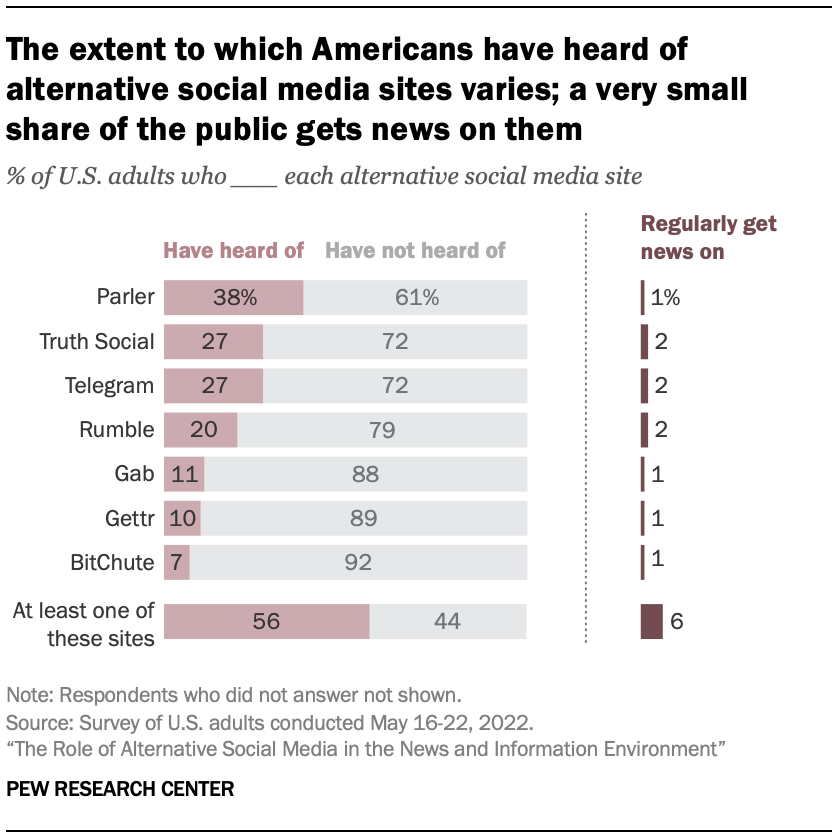
- Overall, 7% of U.S. adults say they have heard of BitChute, and only 1% regularly get news there. Americans are less aware of BitChute than many of the other alternative social media sites studied by the Center. For example, 38% of U.S. adults have heard of Parler, 27% each have heard of Truth Social and Telegram, and 20% have heard of Rumble. Awareness of Gab and Gettr (11% and 10%, respectively) is roughly on par with awareness of BitChute.
Overall, just 6% of Americans regularly get news from at least one of the seven sites the Center studied, and no single site is used for news by more than 2% of U.S. adults. In comparison, many more Americans get news from more established social media sites, including Facebook (31%), YouTube (25%) and Twitter (14%).
- BitChute says it is committed to freedom of expression and is against censorship, but it still moderates content at least to some extent. BitChute also says it opposes “platform bias,” “oppression or incitement” and “mob rule.”
A review of BitChute’s moderation policies from September 2022 shows that it moderates content beyond spam or legal requirements at least to some extent – either by removing posts or suspending or banning accounts deemed to be offensive.
Some of this moderation has occurred as a result of government oversight. In 2021, BitChute updated its community guidelines including a section prohibiting “incitement to hatred” – a step it took after consultation with Ofcom, an oversight agency in the United Kingdom. In 2020, BitChute joined the United Nations’ “Tech Against Terrorism” partnership, leading the platform to remove extremist and violent content such as posts about mass shootings in Christchurch, New Zealand, and Buffalo, New York. BitChute has also banned certain extremist groups from the platform and published its first transparency report. At the same time, BitChute has hosted violent and offensive content in recent years, including videos by at least one creator who called for attacks on members of U.S. Congress in the wake of the Jan. 6 riot at the Capitol.
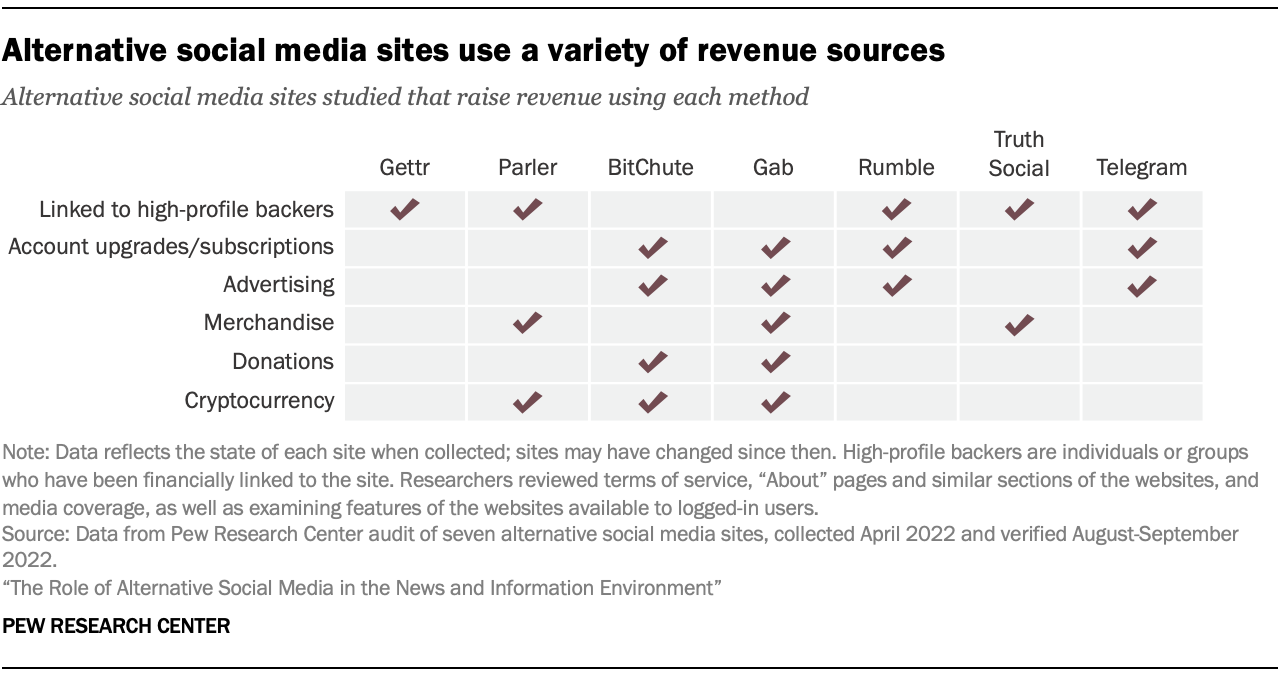
- BitChute uses many revenue streams to support the site, including advertising, donations and account upgrades. BitChute’s “account upgrades” include bronze, silver and gold membership options users can purchase; each option increases the number of video channels an account can host. BitChute also accepts cryptocurrency donations.
- Most of BitChute’s prominent accounts are run by individuals, not organizations. The Center examined 200 prominent accounts on BitChute, selected from those with the most followers. As of June 2022, about nine-in-ten prominent accounts (87%) were individuals, while one-in-ten were organizations. Of those individuals, 8% were individuals with a clear past or present affiliation with an organization of some kind.
- About a third of prominent accounts on BitChute have been banned or demonetized on other social media sites – the highest percentage among the seven sites studied by the Center. As of June 2022, 35% of prominent accounts on the site had been permanently banned, suspended or demonetized on other social media sites. This was higher than the site with the second-highest share, Rumble (22%), and the other sites studied.

- Many prominent BitChute accounts solicit funds from their followers. BitChute and Rumble stand out among the seven sites studied for having particularly large shares of prominent accounts that solicit funds from their followers. Both of these sites focus on video content, which often has high production costs. More than half of the 200 BitChute accounts studied (57%) asked for donations as of June 2022, with 22% doing so using Patreon – a membership platform that allows content creators to receive subscription fees from supporters – and 13% by selling merchandise.
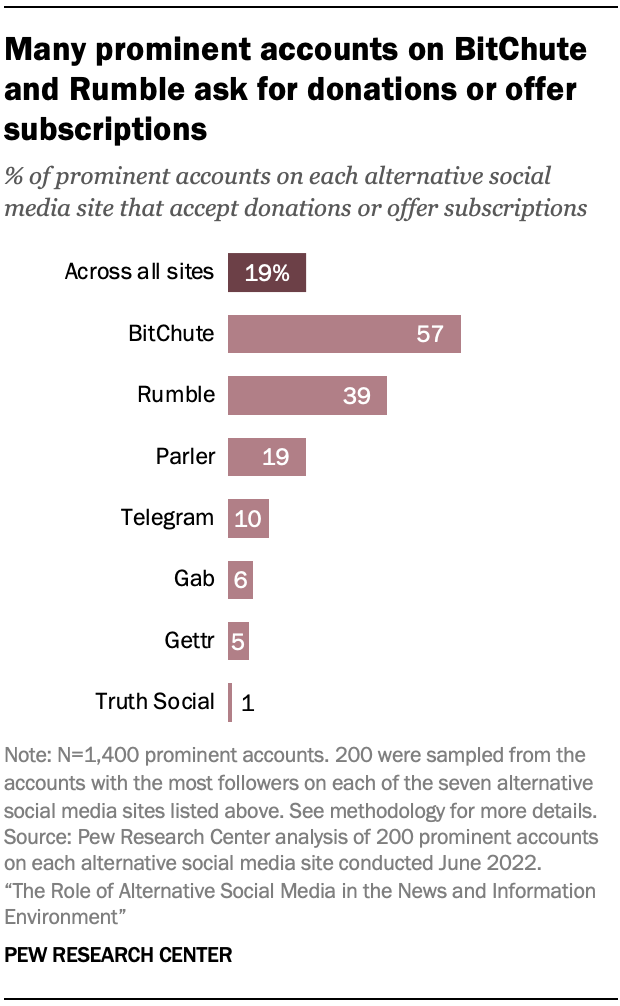
- Fewer than half of prominent BitChute accounts express a political orientation or value or identity appeal. Among the prominent accounts studied in June 2022, 40% contained any political orientation or value or identity appeal in their profiles, a smaller share than four other studied sites (Truth Social, Gab, Gettr and Parler). Similarly, only 3% of prominent BitChute accounts expressed right-leaning views or voiced support of former President Donald Trump, less than any other alternative social media sites the Center studied.
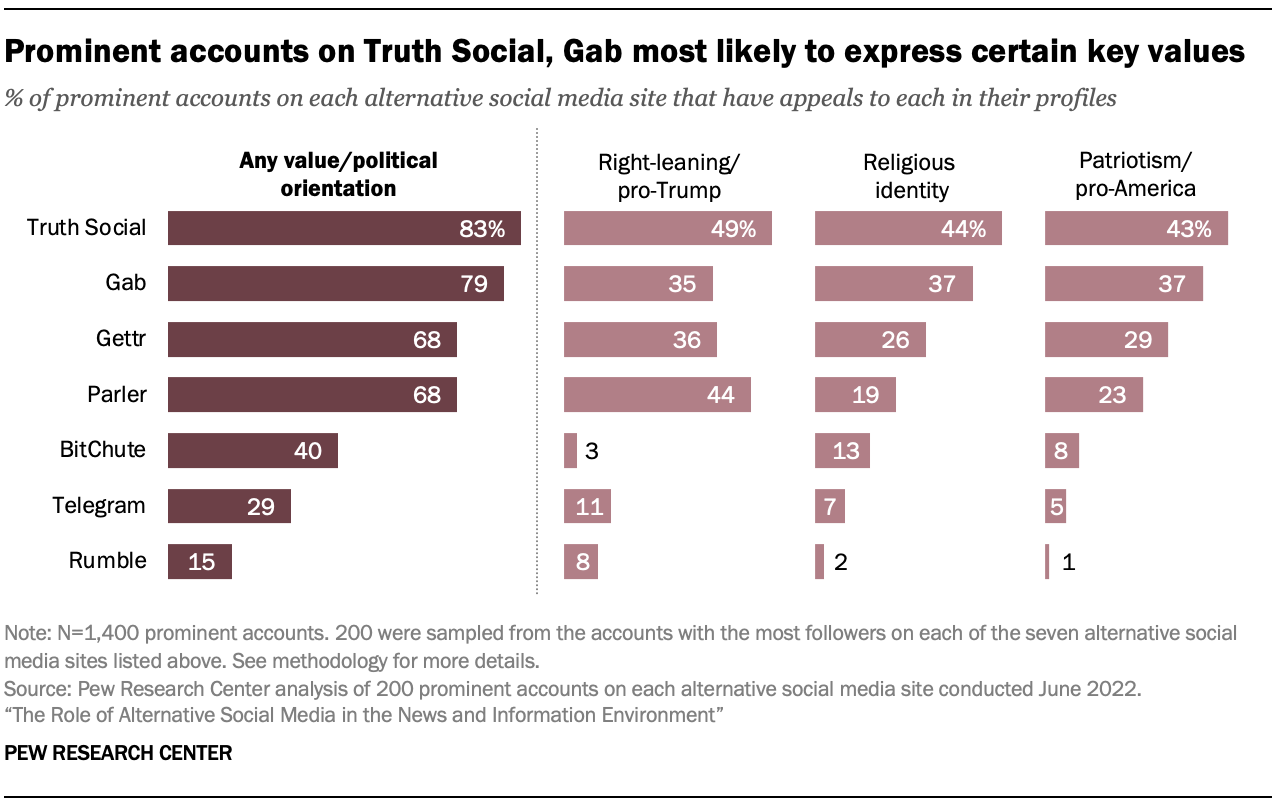
- Abortion, guns and gun rights, and LGBTQ issues were among the subjects that prominent BitChute accounts discussed in June 2022. A review of posts from these 200 accounts found that about half or more posted about abortion (55%), guns and gun rights (53%) or LGBTQ issues (47%); 44% posted about vaccines and 40% posted about the Jan. 6 attack on the U.S. Capitol. (These posts came amid widespread discussion of several high-profile shootings and the Supreme Court’s decision to overturn Roe v. Wade, and at a time when a U.S. House committee was investigating the Jan. 6 riot. Vaccinations and LGBTQ issues were also regularly in the news.)
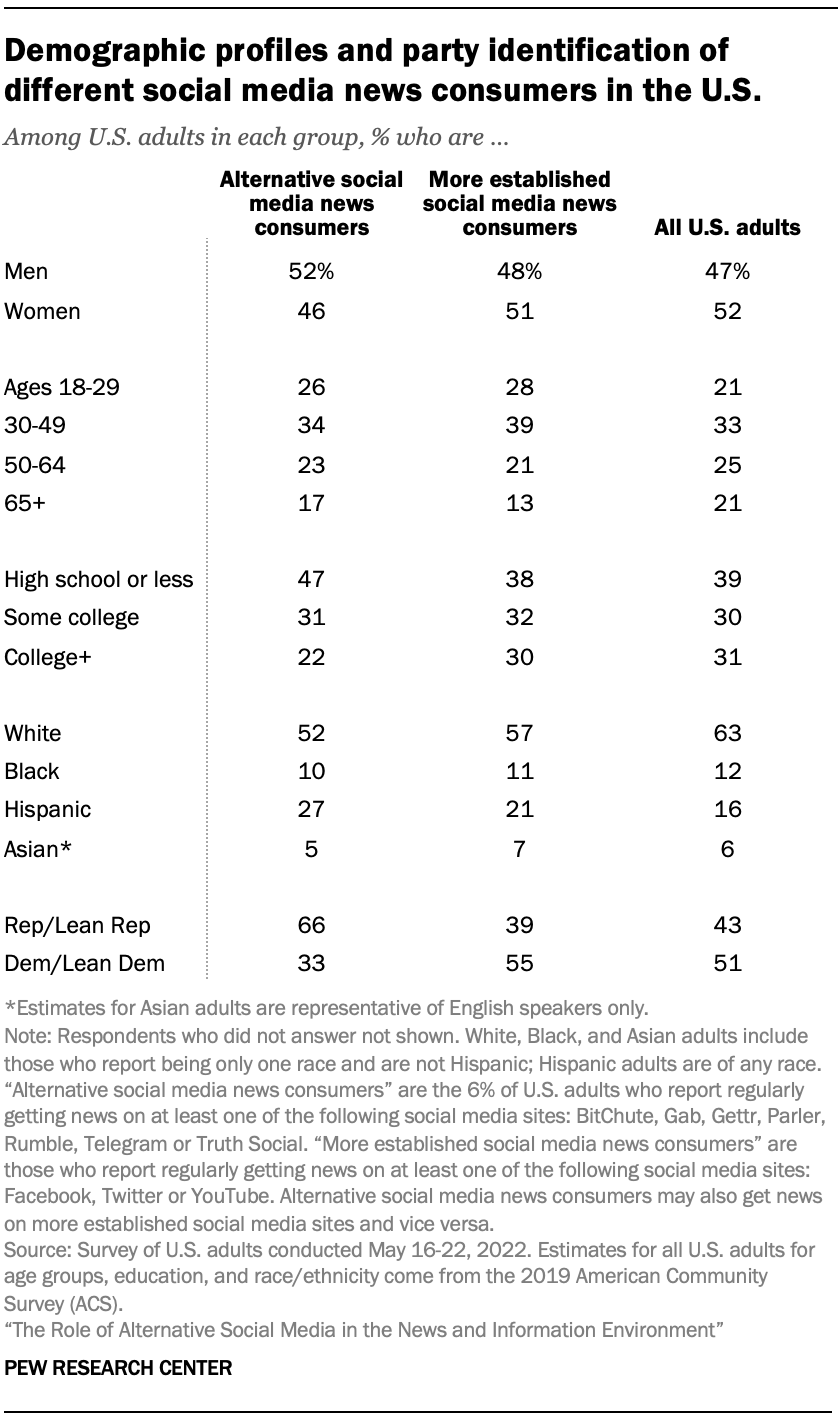
- About two-thirds (66%) of U.S. adults who regularly get news from any of the seven alternative social media sites studied by the Center – including BitChute – identify as Republicans or lean toward the Republican Party. This is far higher than the share who identify as Democrats or who lean Democratic (33%). By comparison, those who get news on at least one of three more established social media sites studied by the Center – Facebook, Twitter and YouTube – are more likely to be Democrats or Democratic leaners than Republicans or Republican leaners.
Note: Here are the questions used in the study, detailed tables and the methodology.




